Ijraset Journal For Research in Applied Science and Engineering Technology
- Home / Ijraset
- On This Page
- Abstract
- Introduction
- Conclusion
- References
- Copyright
Instructional Competencies, Developmental Needs and Performances of Teachers in the New Normal: Basis for Learning and Development Training Plan
Authors: Celia A. Solomon
DOI Link: https://doi.org/10.22214/ijraset.2023.54939
Certificate: View Certificate
Abstract
The study aimed to determine the instructional competencies, developmental needs and performances of teacher in the new normal based on SAT-RPMS which served as basis for developing a learning and development training plan for Social Studies teacher in Antipolo National High School. The study employed descriptive quantitative research. Using total population, 45 Social Studies teachers served as respondents. The Philippine Professional Standards for Teachers (PPST) Self-Assessment tool was used as the main instrument to determine the functional and core behavioral competencies and developmental needs of teachers. In addition, performances of teachers were based on the two classroom observations. The findings of the study revealed that Social Studies teachers are of high level of competence with regards to the majority of indicators or objectives in the Self-Assessment Tool-Result Based Performance Management System. 5 out of 11 indicators is of moderate level. The respondents were also of moderate level when it comes to performing various related work/activities that contribute to the teaching - learning process. In terms of the core behavioral competencies, indicators under result focus revealed that the majority of the respondents rated their self, 3 or most of the time demonstrate the indicators. This means that teachers of Social Studies, still need to improve in terms of processes and approaches that can yield several benefits in teaching and learning. They consistently demonstrate the indicators under self- management, professionalism and ethics and team work, most of the time demonstrate in terms of service orientation and indicators in innovation to be demonstrated sometimes. A learning and development training plan should be proposed based on the developmental needs of Social Studies Teachers. It is recommended that school leaders utilize the result of the study in order to design an appropriate learning and development training plan for the respondents.
Introduction
I. INTRODUCTION
COVID-19 has created degree of tumult and complication that put enormous strain on our educational system. To ensure continuity and quality education, the Department of Education issued DepEd Order No. 12, s. 2020, titled "Adoption of the Basic Education Learning Continuity Plan for School Year 2020-2021 in Light of the Covid-19 Public Health Emergency."
Switching from traditional classrooms and face to face learning/teaching in virtual classrooms has a profound effect to students and teachers. Both experiencing challenges and issues concerning this learning modality. The learning/teaching experiences are entirely different in this new normal situation.
Teachers play an essential role in influencing students' academic and life accomplishments. It is widely assumed that the efficacy of student learning is largely determined by how successfully a classroom teacher performs his or her duties. Given the changing circumstances, our educational system faces the tremendous burden of preparing teachers in terms of teaching and learning. According to Johnson (2020), the abrupt shift to distance learning directly challenged the knowledge, mindsets, and skills of our teacher workforce. He mentioned three considerations for staffing and development in the wake of COVID-19: 1) Identify Upskills Within Existing Teacher Competencies, 2) Consider Reskilling for New Competencies and 3) Upskilling and reskilling will require significant human resource efforts across hiring, onboarding, and development structures. Forde & Torrance (2021) wrote an article that highlight the value of professional learning in developing educators' understandings, abilities, and commitments in order to develop teaching and leadership practice that recognizes and respects all learners' identities and allows them to thrive.
Quality education is mostly determined by the quality of teachers and their ability to perform their duties. The Department of Education emphasizes the importance of professional standards in the continued professional growth and improvement of teachers, based on the idea of lifelong learning. It is dedicated to assisting teachers and acknowledging the overwhelming evidence that effective teachers are critical to improving student achievement.
As specified in D.O. 42, S.2017, entitled National Adoption and Implementation of the Philippine Professional Standards for Teachers (PPST), shall be used as a basis for all learning and development programs for teachers to ensure that teachers are properly equipped to effectively implement the K to 12 Program. By means of precise domain, strands and indicators PPST clearly establishes what quality teacher is.
Llego (2018) wrote an article about the set of professional standards for teachers, a framework that enumerate the developmental advancement of teachers, the refinement of their practice and their response to the intricacies of educational restructurings. Accordingly, teachers must be able to perform the indicated objectives in each seven domains to make them effective educators in the 21st century.
The PPST-based Results-based Performance Management System (RPMS) recalibrated to be responsive to the challenges of the pandemic. RPMS tools for SY 2020-2021 were already validated in 2019 and nationally rolled out for implementation for the school year. But due to the challenges in teaching and learning brought by the pandemic, DepEd-BHROD sought the need to capture these changes in the teachers’ performance management for SY 2020-2021.
The Self- Assessment is a tool provided by PPST that allow teachers to reflect upon and describe their teaching and learning goals, challenges, and accomplishments. There are 11 priority indicators from the Philippine Professional Standards for Teachers (PPST) chosen as RPMS objectives for this school year. These priority indicators were selected based on being more responsive and appropriate to the current context of the teachers, learners, and the learning environment.
Teachers need to evaluate themselves to continue to grow in their profession to be able to cope up with the new learning modality of delivering education to learners in this time of pandemic. Although evaluating one's personal strengths and weaknesses is challenging, it is essential since it will allow school leaders to build an effective performance improvement plan for teachers to advance in their careers.
The utilization of SAT-RPMS could provide useful data that will lead school leaders to design learning and development training program. One of the most crucial element of quality teaching and learning in every institutions is the professional development for teachers. Cox (2019) cited that professional development should be in accordance to the different needs of diverse teachers. Since teachers have different instructional capability, knowledge, and experience. It should also be adequately flexible because it allows teachers to distinguish and toil on their various needs. Teachers need a variety of professional development skills along with knowledge of their subject matter and experience in order to be an effective teacher. Hartshorne, et. al., (2021) argued that researchers would make more progress identifying characteristics of effective professional development by looking for alignment between evidence from basic research on human skill acquisition and features of rigorously evaluated PD interventions.
As cited by Biana, Javier & Jabar (2021) professional development is the key to meeting today’s educational challenges. Accordingly, the participation of teachers in professional development activities remarkably manifested positive effects on teachers’ beliefs and practices, students’ performance in learning, and on educational improvement. Professional development is the center of lifelong learning and has a huge impact on teaching practice and achieving students’ needs.
Furthermore, Erickson et.al., (2017), stated that to ensure that teacher gains learnings, techniques and skills that are essential to positively affects students leaning, professional development that should be given to teachers be evidenced based and of high quality. In addition, according to Mendoza (2018), since it is very clear that teachers are important in advancing learners’ achievement, because quality learning depends on the quality of teaching. It is therefore a must to prioritize enhancing teachers’ quality. Also according to Mizell (2018) an effective professional advancement empowers educators to improve the knowledge and skills they must have in order to address the learners’ learning challenges. It cannot be called effective unless there will a perceivable improvement in the teaching skills of teachers
It is along this context that the researcher believes that there is a need to conduct this study to be able to determine the instructional competency both functional and core behavioral competencies of teachers, their developmental needs and their performances in the new normal.
This study is conducted to determine the instructional competencies, developmental needs and teacher performance in the new normal. Specifically, it aims to answer the following questions:
- What is the profile of the Social Studies teachers in terms of:
a. Sex
b. Age
c. Highest Educational Attainment
d. Position
e. Number of years as school head, department head or master teacher.
2. What is the level of instructional competencies (functional and core behavioral) of Social Studies teachers?
3. What are the developmental priority needs of Social Studies Teacher as reflected in the Self-Assessment Tool Result- Based Performance Management System?
4. What is the level of teachers’ performance based on the three indicators used during the classroom observation?
5. Based on the result of the study, what were the developmental needs of Social Studies teacher in the new normal that should be included in the learning and development training plan?
The researcher believes that this study is beneficial. To learners, they can be recipient of quality instruction delivered by teachers who shall have gained awareness of their instructional competencies, developmental needs and performances. Result of this study, might serve as an eye opener of teachers developmental needs. It will help them recognize the need to possess a desirable competency needed to provide quality education. School leaders may gain insight on crafting learning and developmental training plan that is suited to teachers need. Lastly, this study will help also serves as reference for future researchers in similar study.
This study was focused on determining the instructional competency (functional and core behavioral), developmental needs and performances of Social Studies teachers in Antipolo National High School based on the Self-Assessment Tool Result Based Performance Management System.
The respondents of the study were 45 Social Studies teachers from across all grade level of ANHS during the school year 2020-2021.
To facilitate better and clear understanding of the study, the following terms are hereby defined operationally. Instructional competency refers to the underlying skills, knowledge and attitudes which are defined and described in observable terms, and are necessary for teachers in performing their roles. Developmental needs refer to the objectives indicated in the self-assessment tool that has rated low or moderate level. Professional Development, in education, this may refer to various seminars, trainings, workshops or professional advancement that help educators progress in their competence and effectiveness. Respondents operationally refers to Social Studies teachers who have been invited to participate in the study. Result-Based Performance Management System (RPMS) is a mechanism to observe and assess performance an ascertain what is needed by the organization in order to grow. Teacher performance, operationally refers to the rating of teacher during the two class room observation in the three indicator identified as classroom observable in the 11 indicators.
This study is anchored on Malcolm Knowles theory of Adult Learning Theory. In education change is inevitable. Since the study intends to determine the developmental needs of teachers who are continuously learning, growing and adjusting to new practices in this time of pandemic, being cognizant of adult learning theories will assist school leaders in implementing effective, timely and sustainable professional development for teachers.
Below is the research paradigm. Figure 1 shows that the profile of the Social Studies teachers were surveyed. It includes the sex, age, highest educational attainment, position, and number of years in teaching. A self- rating competency tool were given to the participants of the study. The result of the study gathered the developmental needs of the respondents and their performance in the different indicators. This served as basis for the proposed learning and development training plan.
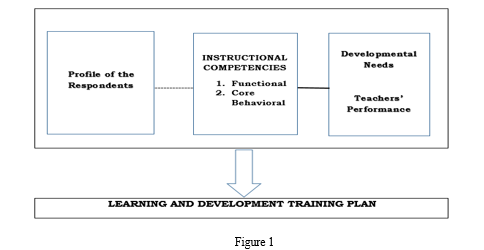
II. METHODOLOGY
This chapter discusses the methods or research design, sources of data, data gathering instrument, data gathering procedure, statistical treatment used in this study and ethical considerations.
This study used descriptive quantitative research. It attempts to collect quantifiable information for statistical analysis
This study was conducted at Antipolo National High located at Olalia Road, Brgy. Sta Cruz, Antipolo City. The school is the biggest public school in the division of Antipolo City and consider to be the mother school of all schools in the Secondary in Antipolo City. Antipolo National High School is geared towards academic excellence and the assimilation of a sound ethical and moral values. With this objective, the school exerts its effort of keeping at trend to the modern demands of present time. Improvement of facilities and upgrading teachers to the new innovation in education has been the major thrust of the school.
The researcher employed the total population sampling that all Social Studies teacher in Antipolo National High School were considered in the study.
There are 45 Social Studies teachers in Antipolo National High School. District I-A, City Schools Division Office of Antipolo across all grade level during the school year 2020-2021.All of them were respondents.
A survey questionnaire to gather information from the respondents was utilized. The Philippine Professional Standard for Teachers (PPST) Self-Assessment Tool which is the official assessment tool of the Department of Education will be the main instrument to be used in determining the instructional competencies and developmental needs of teachers.
The SAT-RPMS which served as the main data gathering instrument of the researcher was developed and validated nationally and signed into policy through DepEd Order No. 42, s. 2017.
The researcher has a moral obligation to strictly consider the rights of the participants who were part of this study.
The researcher asked permission to the principal of Antipolo National High School, to allow her to conduct the study and gather data.
Throughout the study, the researcher adhered to ethical principles and strive for consistency of the data and the results of the study.
The researcher assured the respondents of the confidentiality of the data gathered to them.
The data that gathered in this study solely be used as basis for learning and development training plan for Social Studies teachers. Data gathered was organized, tabulated, analyzed and treated using weighted mean, frequency, percentage and rank. The data were interpreted quantitatively by the researcher.
III. RESULTS AND ANALYSIS
This sections briefly presents the results, analysis, and interpretations of the data gathered based on the problems presented in the research.
A. Problem 1: Respondents Profile
The profile of the respondents was determined. It includes the sex, age, highest educational attainment, position, and number of years in teaching.
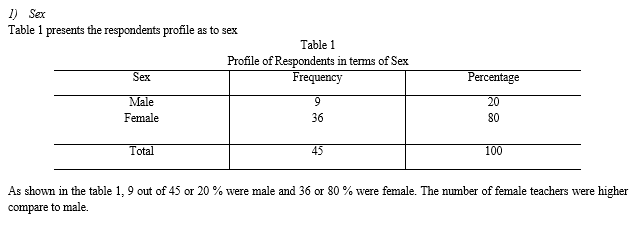

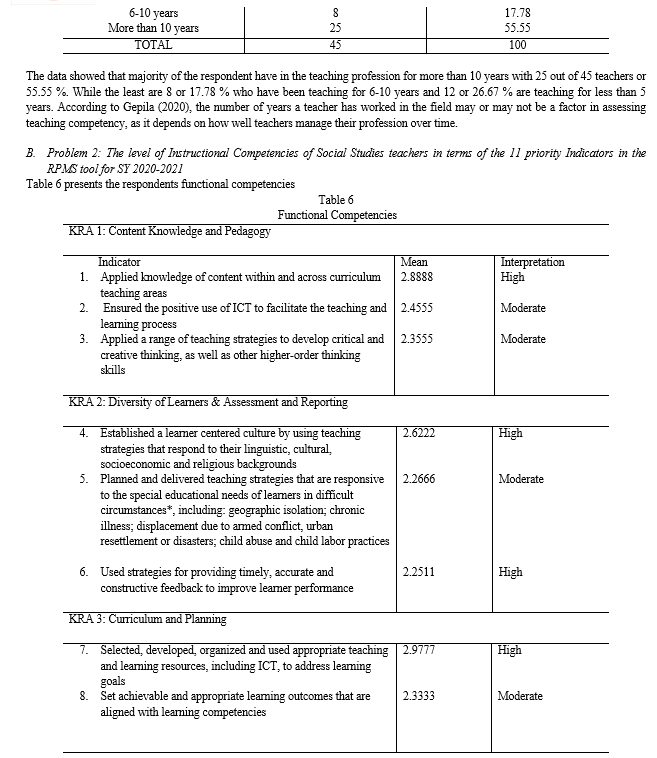
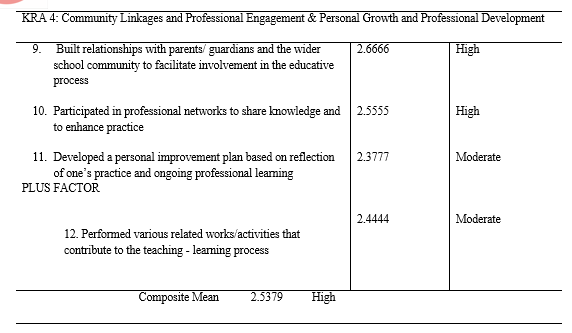
Legend: Very High= 3.50-4.00 High= 2.50-3.49, Moderate= 1.50-2.49, Low= 1.00-1.49
The data presented on table 6 revealed the level of functional competencies of Social Studies in performing the 11 priority indicators and plus factor from the Philippine Professional Standards for Teachers (PPST) chosen as RPMS objectives for this school year. In terms of Content Knowledge and Pedagogy, teachers possessed a high level of competency in the first indicator with a mean of 2.8888 while the remaining two indicators have a mean of 2.4555 and 2.3555 respectively which indicate a moderate level in the given competencies. This means that the school need to focus on the two indicators to achieve a high level ability in performing the said indicators. In terms of Diversity of Learners & Assessment and Reporting, teachers possessed a high level ability in the two indicators with 2.6222 and 2.5111 mean respectively and moderate level in one indicator with a mean of 2.2666. It is also deemed necessary for teachers to plan and deliver teaching strategies that are responsive to the special educational needs of learners especially in this pandemic. According to Kubacka & D’Addio (2020) to support inclusive teaching and learning, teachers need to recognize the experiences and abilities of every student and be open to diversity. While many teacher education and professional learning opportunities are designed accordingly, others might still be entrenched in the views of exclusionary practices. In addition, many teachers might be missing out on any kind of professional training
With regards to Curriculum and Planning, the mean of 2.9777 or high in the first indicator pertaining to the use of ICT, and 2.3333 which mean moderate in terms of setting achievable and appropriate learning outcomes that are aligned with learning competencies. This may imply of the needs of teachers to be provided with trainings, or webinars in the use of Most Essential Learning Competencies(MELC) which has been utilized by teachers this school year in crafting learning activities as well as the daily lesson log and weekly home learning plan.
On the other hand, in terms of Community Linkages and Professional Engagement & Personal Growth and Professional Development, teachers possessed a high level ability with the first two indicators with 2.6666 and 2.5555. This means that Social Studies teachers have a strong engagement with parents and guardians as well as to the community which is very crucial in this new normal situation since parents are now home learning facilitators because of the new learning modality. Building a positive relationship and constant communication with parents is important. Based on the data, teachers participated in professional networks to share knowledge and to enhance practice. The teachers were given the opportunity to attain free webinars given by different institutions and organizations and provided them with new knowledge, ideas and skills needed for the different learning modality at present. With regards to last indicator in Community Linkages and Professional Engagement & Personal Growth and Professional Development, the respondents have a moderate level with a mean of 2.3777. This imply that teachers still need to improve in developing a personal improvement plan based on reflection of one’s practice and ongoing professional learning.
With so many opportunities for free webinars, teachers should really reflect of what is actually needed that will bring positive outcomes for students and not only for the sake of getting a certificate. Lastly, for the plus factor, the data showed that respondents possessed a moderate level ability with a mean 2.4444 in performing various related works/activities that contribute to the teaching - learning process. This may be due to the number of teachers in Antipolo National High School. Not all were given the opportunity to perform various task such as curriculum writer, speaker, coordinator and other related works.
 \
\
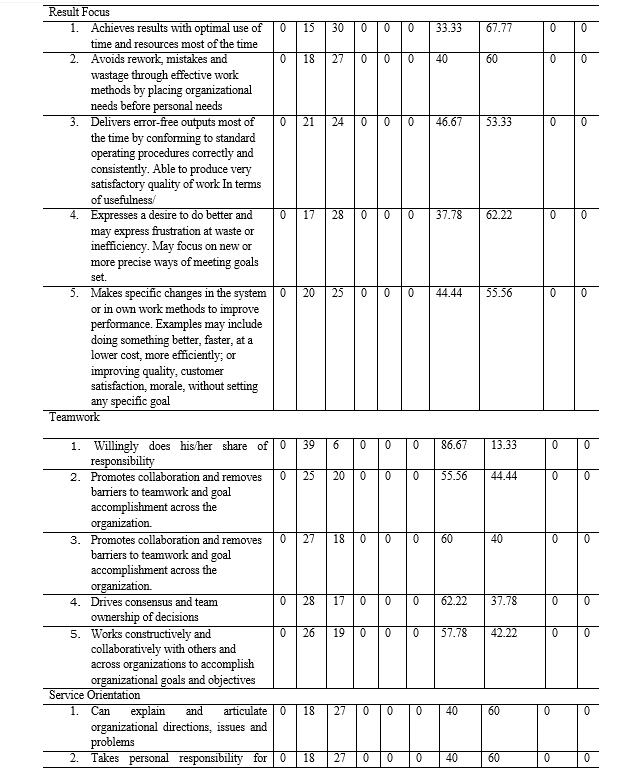
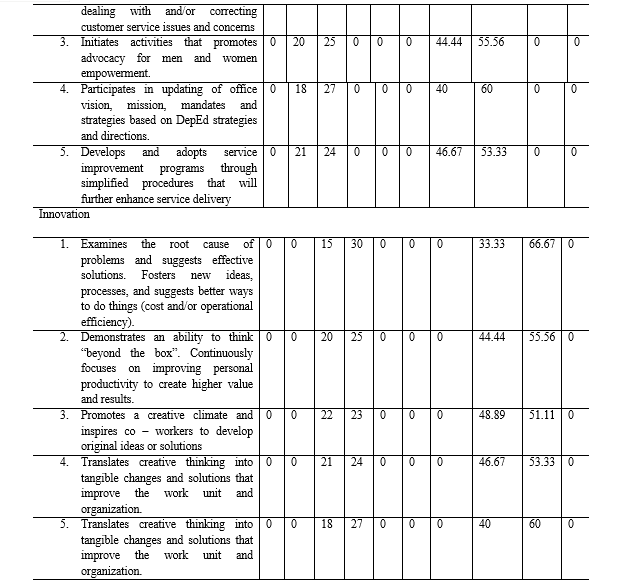
Legend: 5 – Role model; 4 – Consistently demonstrates; 3 – Most of the time demonstrates; 2 – Sometimes demonstrates; 1 – Rarely demonstrates
The data presented in table 7 revealed the core behavioral competencies of social studies teachers. In terms of self -management, majority of the respondents consistently demonstrates personal actions and behaviors that are clear and purposive and takes into account personal goals and values congruent to that of the organization and emotional maturity and enthusiasm for and is challenged by higher goals while most of the time they demonstrate on the other 3 indicators under self-management. In terms of professionalism and ethics, it can be gleaned that the social studies teachers consistently demonstrate all indicators. It means that teachers are guided in providing quality education and inculcating values among their students. On the other hand, the data on the different indicators under result focus revealed that the majority of the respondents rated their self, 3 or most of the time demonstrate the said indicators. This means that teachers of Social Studies, still need to improve in terms of processes and approaches that can yield several benefits in teaching and learning. When viewed according to their responses in the team works indicators, the respondents manifested to consistently demonstrate the different indicators. Team is very important in any organization to achieve any goals. According to Wehbe (2017), the ability to simultaneously perform as an individual and together with your colleagues or employees in effective teamwork is key to attaining growth and success. In term of Service orientation, majority of the respondents answered to demonstrate most of the time the five indicators. Lastly, when it comes to innovation, the data revealed that majority of the respondents answered 2 or they demonstrate the different indicators sometimes. Teachers are encouraged to research, explore, and use all of the tools available to learn something new through innovation in education. Innovation entails a new way of approaching and solving problems. It also benefits education especially in this time of pandemic. As manifested in the data, Social Studies teachers still need to improve with regards to innovation.
C. Problem 3: Developmental Priority Needs of Social Studies Teachers
Table 8 presents the developmental priority needs of Social Studies Teacher as reflected in the Self-Assessment Tool Result- Based Performance Management System
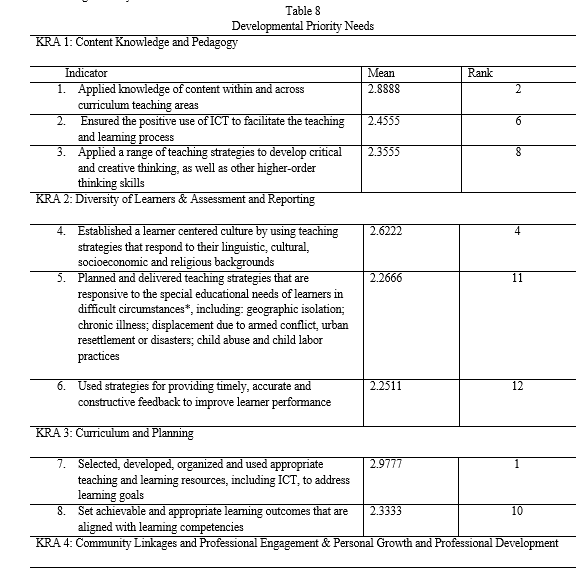
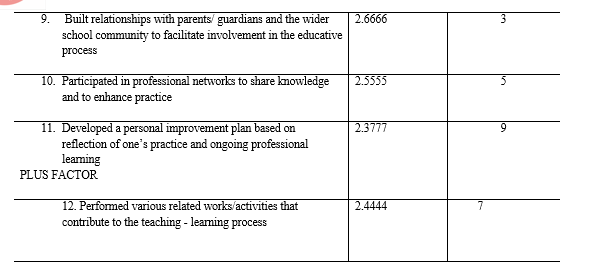
The data in table 8 shows the developmental priority needs of Social Studies teachers. The 11 indicators and the plus factor indicator were ranked according to their mean. The result shows that the indicators ranked 8-12 were considered to be the top 5 developmental priority needs of the respondents. The indicators are 1) Applied a range of teaching strategies to develop critical and creative thinking, as well as other higher-order thinking skills, ranked 8 and under Content Knowledge and Pedagogy, 2) Developed a personal improvement plan based on reflection of one’s practice and ongoing professional learning, ranked 9 under Community Linkages and Professional Engagement & Personal Growth and Professional Development, 3) Set achievable and appropriate learning outcomes that are aligned with learning competencies, ranked 10, under curriculum and planning, 4) Planned and delivered teaching strategies that are responsive to the special educational needs of learners in difficult circumstances*, including: geographic isolation; chronic illness; displacement due to armed conflict, urban resettlement or disasters; child abuse and child labor practices, ranked 11 and 5) Used strategies for providing timely, accurate and constructive feedback to improve learner performance, ranked 12. The last two ranked indicators, were under Diversity of Learners & Assessment and Reporting. The data may imply that since, shifting from face to face learning to virtual class, teachers were having adjustment to the new learning modality, so they expressed a moderate level in planning and developing teaching strategies that are responsive to special educational needs, since teaches have limited contacts with their students. Likewise, respondents manifested moderate level in providing timely, accurate and constructive feedback particularly those teachers assigned in the modular learning modality because of limited contact to students and parents.
Based on the result of the core behavioral competencies in table 7, the indicators under innovation were the developmental needs of Social Studies teachers.
Bangao, B. J. D. (2020) mentioned in his study that professional development of teachers needs to be addressed. Teachers should diversify their learning approaches to take the needs of diverse learners. Community linkage should be strengthened, and school heads should fully implement continuing education programs for teachers.
D. Problem 4: Level of teachers’ performance based on the three indicators used during the classroom observation


Conclusion
This outlines the summary of findings, conclusions and recommendations of the study. Summary of the findings presents the key information derived from results of the survey questionnaire. Conclusions express the judgments attained by the researcher based on the findings. Recommendations suggest some possible solutions in response to the issues pointed out in the conclusion. The profile of Social Studies teachers in terms of “Sex’ is that majority of the respondents were female. While with regards to “Age”, most of the respondents are within the age bracket of 21-45. In terms of educational attainment, majority have MS/MA units. In terms of “years in service”, a huge number of respondents have been teaching for more than 10 years but majority are teacher I with regards to teaching position. The level of instructional competencies of Social Studies teachers in terms of the 11 priority indicators in the RPMS tool for SY 2020-2021 is of high level and with regards to core behavioral competency, the respondents need to improve in innovation. The respondents performed well during the observation based on the high rating obtained by majority of the teacher for the first and second classroom observation. A learning and development training plan was proposed based on the perceived functional and core behavioral competencies of teachers. The result of the classroom observations was also considered to address the diverse needs of the respondents. Based on the findings, the following conclusions were drawn. 1) Majority of the respondents were female, 36 out of 45 respondents. Most of the respondents are within the age bracket of 21-45, 35 out 45 respondents and 10 of them in the age bracket of 46-65. In terms of educational attainment, majority of the respondents have started earning units in their masters’ degree program. There are 13 bachelor degree holder, 11 master’s degree holder and 4 are now enrolled in their Doctorate degree. Despite that majority of the respondents have been in teaching field for more than 10 years, majority are still in teacher I position. This means that there were no opportunities for promotion or they may still lack requirements to be promoted. Social Studies teachers are of high level of competence with regards to the majority of indicators or objectives in the Self-Assessment Tool-Result Based Performance Management System. 5 out of 11 indicators is of moderate level. The respondents were also of moderate level when it comes to performing various related works/activities that contribute to the teaching - learning process. In terms of the core behavioral competencies, indicators under result focus revealed that the majority of the respondents rated their self, 3 or most of the time demonstrate the said indicators. This means that teachers of Social Studies, still need to improve in terms of processes and approaches that can yield several benefits in teaching and learning. They consistently demonstrate the indicators under self- management, professionalism and ethics and team work, most of the time demonstrate in terms of service orientation and indicators in innovation to be demonstrated sometimes. The following indicators are the developmental needs of Social Studies teachers : 1) Applied a range of teaching strategies to develop critical and creative thinking, as well as other higher-order thinking skills, ranked 8 and under Content Knowledge and Pedagogy, 2) Developed a personal improvement plan based on reflection of one’s practice and ongoing professional learning, ranked 9 under Community Linkages and Professional Engagement & Personal Growth and Professional Development, 3) Set achievable and appropriate learning outcomes that are aligned with learning competencies, ranked 10, under curriculum and planning, 4) Planned and delivered teaching strategies that are responsive to the special educational needs of learners in difficult circumstances*, including: geographic isolation; chronic illness; displacement due to armed conflict, urban resettlement or disasters; child abuse and child labor practices, ranked 11 and 5) Used strategies for providing timely, accurate and constructive feedback to improve learner performance, ranked 12. Majority of the respondents were outstanding when it comes to using ICT during their classroom observation. This supported the result shown in table 8, where in the indicators 7, ranked 1 meaning teachers of Social Studies have a high level of competency when it comes to using different technology. A learning and development training plan should be proposed based on the developmental needs of Social Studies Teachers. Based on the conclusions, the following recommendations were drawn after the undertaking of the study: 1) School leaders can utilize the result of the study in order to design an appropriate learning and developmental training plan. 2) School leaders, department head and master teachers should provide technical assistance to other teachers especially to those new in the field of teaching. 3) Teachers may engage in different higher level of seminars and workshop. 4) Teachers may also pursue their Master’s or Doctorate degree to hone their knowledge and skills. 5) Future researchers may conduct a parallel study and could utilize the present study as baseline data.
References
ONLINE REFERENCES [1] Bangao, B. J. D. (2020). Competency Level of Junior High School Science Teachers in Mountain Province, Philippines. PalArch\'s Journal of Archaeology of Egypt/Egyptology, 17(2), 547-558. [2] Biana, H. T., Javier Jr, R., & Jabar, M. (2021). Assessing Cultural, Linguistic, and Indigenous Competencies: The Case of Early Childhood Care and Development Teachers in the Philippines. Asia-Pacific Journal of Research in Early Childhood Education, 15(1). [3] Cox, J. (2019) 15 Professional Developmental skills for modern teacher. Retrieve from https://www.teachhub.com/professional-development/2019/11/15-professional-development-skills-for-modern-teachers/ on July 28, 2021 [4] Erickson et.al. (2017). Measuring the quality of professional development training. Professional Development in Education, v43 n4 p685-688. [5] Forde, C., & Torrance, D. (2021). The place of professional growth and professional learning in leading socially just schools. [6] Gepila Jr, E. (2020). Assessing teachers using Philippine standards for teachers. Universal Journal of Educational Research, 8(3), 739-746. [7] Hartshorne, R., Baumgartner, E., Kaplan-Rakowski, R., Mouza, C., & Ferdig, R. E. (2020). Special issue editorial: Preservice and inservice professional development during the COVID-19 pandemic. Journal of Technology and Teacher Education, 28(2), 137-147. [8] Kubacka, K., & D’Addio, A. C. (2020). Targeting Teacher Education and Professional Development for Inclusion. Journal of international cooperation in education, 22(2), 89-106. [9] Llego, Mark Anthiny (2018). Philippine Professional Standards for Teachers. https://www.teacherph.com/philippine-professional-standards-for-teachers/ on July 20,2021. [10] Mendoza, Lorenzo M. (2018). Standards as bases for Teachers performance. Published on Sun Star Davao. [11] Mizell, H. (2018). Why professional development matters. Retrieved from https://learningforward.org/wp-content/uploads/2017/08/professional-development-matters.pdf on July 10,2021 [12] Wehbe, S. 2017 5 Important Reasons Why Teamwork Matters! https://www.potential.com/articles/5-important-reasons-why-teamwork-matters/ WEBSITES [1] https://www.edelements.com/blog/upskilling-and-reskilling-for-the-new-normal-of-education [2] https://www.deped.gov.ph/2017/08/11/do-42-s-2017-national-adoption-and-implementation-of-the-philippine-professional-standards-for-teachers/ [3] https://region8.deped.gov.ph/wp-content/uploads/2021/01/RM-s2021-024 [4] https://www.deped-click.com/2021/01/classroom-observation-tool-cot-for-t-i.html
Copyright
Copyright © 2023 Celia A. Solomon. This is an open access article distributed under the Creative Commons Attribution License, which permits unrestricted use, distribution, and reproduction in any medium, provided the original work is properly cited.

Download Paper
Paper Id : IJRASET54939
Publish Date : 2023-07-23
ISSN : 2321-9653
Publisher Name : IJRASET
DOI Link : Click Here
 Submit Paper Online
Submit Paper Online

